SUMMARY
This is AI generated summarization, which may have errors. For context, always refer to the full article.
- Syria’s showdown
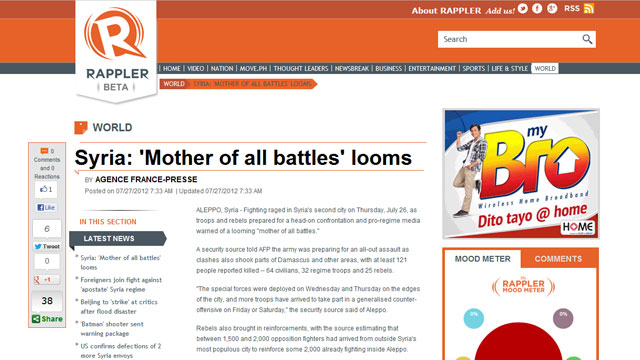 Fighting rages in Syria’s second city, Aleppo, as pro-regime media warned of a looming “mother of all battles.” Reports say at least 121 people are dead, 64 civilians, 32 regime soldiers and 25 rebels. There is increasing pressure for some sort of intervention. UN secretary General Ban Ki-moon urged world leaders to stop the slaughter in Syria. “The Syrian people will pay the price for this failure [to act],” said Germany’s UN ambassador Peter Wittig. Russia’s envoy Vitaly Churkin retorted pledges by some Western nations to support Syrian opposition “contributes and leads to an escalation of confrontation.” This follows the defection of two more senior Syrian diplomats from the regime of President Bashar al-Assad. Syria’s representatives in the United Arab Emirates and Cyprus, husband and wife, fled to Qatar.
Fighting rages in Syria’s second city, Aleppo, as pro-regime media warned of a looming “mother of all battles.” Reports say at least 121 people are dead, 64 civilians, 32 regime soldiers and 25 rebels. There is increasing pressure for some sort of intervention. UN secretary General Ban Ki-moon urged world leaders to stop the slaughter in Syria. “The Syrian people will pay the price for this failure [to act],” said Germany’s UN ambassador Peter Wittig. Russia’s envoy Vitaly Churkin retorted pledges by some Western nations to support Syrian opposition “contributes and leads to an escalation of confrontation.” This follows the defection of two more senior Syrian diplomats from the regime of President Bashar al-Assad. Syria’s representatives in the United Arab Emirates and Cyprus, husband and wife, fled to Qatar.
Read more on Rappler - PH: 1 baby born every 15 secs, 4 babies every minute
 Made in the Philippines: every 15 seconds, 1 baby is born; every minute, there are 4 new Filipinos. That makes more than 3 million babies born every year in Asia’s largest Roman Catholic nation. It’s a statistic that has social, political and economic repercussions that’s forcing legislators to take a stance. The House of Representatives will vote on August 7 on the Reproductive Health Bill, which mandates government support for sex education and birth control methods. If it goes to the period of amendments, as it has in the Senate, there’s a slim chance this controversial bill may pass the 15th Congress. President Aquino campaigned to push it but only gave a slight reference to it in his State of the Nation address this week. The Catholic Church opposes it.
Made in the Philippines: every 15 seconds, 1 baby is born; every minute, there are 4 new Filipinos. That makes more than 3 million babies born every year in Asia’s largest Roman Catholic nation. It’s a statistic that has social, political and economic repercussions that’s forcing legislators to take a stance. The House of Representatives will vote on August 7 on the Reproductive Health Bill, which mandates government support for sex education and birth control methods. If it goes to the period of amendments, as it has in the Senate, there’s a slim chance this controversial bill may pass the 15th Congress. President Aquino campaigned to push it but only gave a slight reference to it in his State of the Nation address this week. The Catholic Church opposes it.
Read more about sex in the city and the upcoming vote – all on Rappler. - Cybercriminals, Beware!
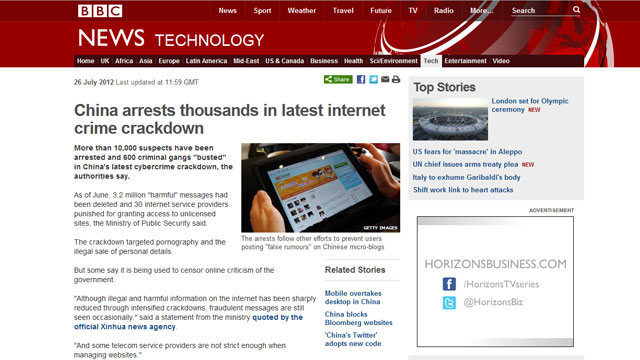 Chinese authorities say they’ve arrested more than 10,000 suspects and busted 600 criminal gangs in the country’s latest cybercrime crackdown. While claiming to focus on pornography and the illegal sale of personal details, many fear it’s a thinly veiled attempt to censor online criticism of the government. As of June, China’s Ministry of Public Security said 3.2 million “harmful” messages were deleted and 30 internet service providers punished for giving unlicensed sites access. Chinese local authorities were also doing their own clean-up: Beijing’s police force said it arrested more than 5,000 people suspected of internet-related crims and closed 263 internet cafes “to protect the physical and mental health of young people.”
Chinese authorities say they’ve arrested more than 10,000 suspects and busted 600 criminal gangs in the country’s latest cybercrime crackdown. While claiming to focus on pornography and the illegal sale of personal details, many fear it’s a thinly veiled attempt to censor online criticism of the government. As of June, China’s Ministry of Public Security said 3.2 million “harmful” messages were deleted and 30 internet service providers punished for giving unlicensed sites access. Chinese local authorities were also doing their own clean-up: Beijing’s police force said it arrested more than 5,000 people suspected of internet-related crims and closed 263 internet cafes “to protect the physical and mental health of young people.”
Read more on the BBC. - Facebook growth slows, shares tumble 10%
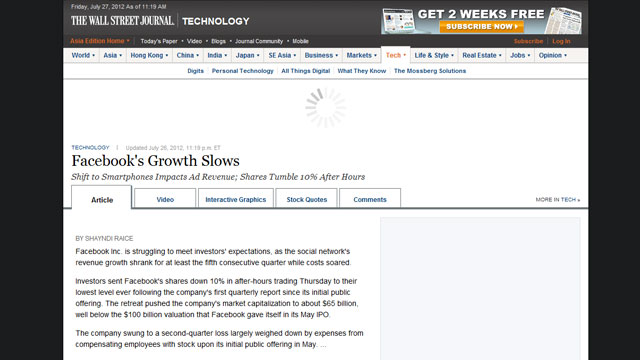 Facebook reported a loss of US$157 million Thursday in its first earnings report after its troubled initial public offering. The company’s shares plunged 10% in after-hours trade. This is a day after its partner, Zynga, reported disappointing earnings. This puts Facebook’s market capitalization at about $65 billion, well below the $100 billion valuation that the company said it was worth in its May IPO. Despite that, its results for the second quarter showed a profit of 12 cents a share, in line with most forecasts, as revenue rose to $1.18 billion, a little above market estimates. Still this revenue growth is the lowest since at least the 1st quarter of 2011, when Facebook was more than doubling the amount of money it brought in from advertising. The reason? Facebook’s shift to smartphones! More users are going to the site on their phones instead of their computers.
Facebook reported a loss of US$157 million Thursday in its first earnings report after its troubled initial public offering. The company’s shares plunged 10% in after-hours trade. This is a day after its partner, Zynga, reported disappointing earnings. This puts Facebook’s market capitalization at about $65 billion, well below the $100 billion valuation that the company said it was worth in its May IPO. Despite that, its results for the second quarter showed a profit of 12 cents a share, in line with most forecasts, as revenue rose to $1.18 billion, a little above market estimates. Still this revenue growth is the lowest since at least the 1st quarter of 2011, when Facebook was more than doubling the amount of money it brought in from advertising. The reason? Facebook’s shift to smartphones! More users are going to the site on their phones instead of their computers.
Read more on Rappler and the Wall Street Journal - Twitter, Google Talk down on eve of Olympics
 Around 10:40 GMT Thursday, Google Talk died. Rappler was one of its casualties, a scheduled Google + Hangout on Cinemalaya and the state of Philippine cinema. A short while later at 17:20 GMT, Twitter goes down because of a freak double failure in its data centers a day before the London Olympics. Twitter has partnered with NBCUniversal to collate the millions of tweets expected to be sent during the Games by atheltes, fans and NBC TV personalities onto a single Twitter page. Is it up to the challenge?
Around 10:40 GMT Thursday, Google Talk died. Rappler was one of its casualties, a scheduled Google + Hangout on Cinemalaya and the state of Philippine cinema. A short while later at 17:20 GMT, Twitter goes down because of a freak double failure in its data centers a day before the London Olympics. Twitter has partnered with NBCUniversal to collate the millions of tweets expected to be sent during the Games by atheltes, fans and NBC TV personalities onto a single Twitter page. Is it up to the challenge?
Read more about Twitter’s blackout and Google Talk on Rappler. - Chinese hauling corals from Philippines
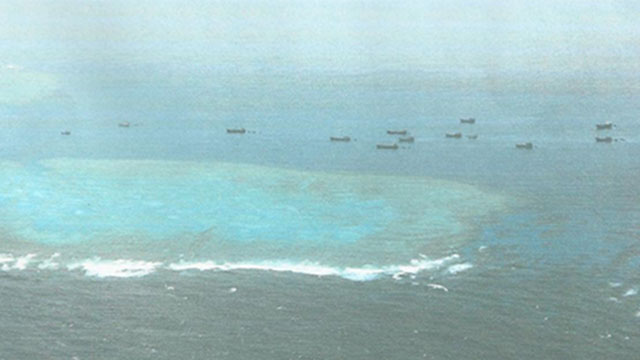 More than 20 Chinese fishing boats have been hauling corals within Philippine territory, and they’re making Filipinos angry. The boats reached the Philippines Pag-asa Island on Tuesday, July 24, and have been pulling large coral heads using steel cables and winches, according to Kalayaan Mayor Eugeion Bito-onon. A Rappler military source said the fishing boats were escorted by Chinese frigates. The Armed Forces of the Philippines and China have not made any statements and the military has been told to stand down, presumably to avoid escalation. Conflict over disputed territories in the South China Sea erupted April during a standoff between China and the Philippines over Scarborough Shoal. Both countries have tried to ease tensions, but this dispute delayed the signing of a closing agreement at this year’s ASEAN Ministerial Meeting. Security analysts say the competing interests of nations and corporations make the South China Sea one of the world’s volatile flashpoints.
More than 20 Chinese fishing boats have been hauling corals within Philippine territory, and they’re making Filipinos angry. The boats reached the Philippines Pag-asa Island on Tuesday, July 24, and have been pulling large coral heads using steel cables and winches, according to Kalayaan Mayor Eugeion Bito-onon. A Rappler military source said the fishing boats were escorted by Chinese frigates. The Armed Forces of the Philippines and China have not made any statements and the military has been told to stand down, presumably to avoid escalation. Conflict over disputed territories in the South China Sea erupted April during a standoff between China and the Philippines over Scarborough Shoal. Both countries have tried to ease tensions, but this dispute delayed the signing of a closing agreement at this year’s ASEAN Ministerial Meeting. Security analysts say the competing interests of nations and corporations make the South China Sea one of the world’s volatile flashpoints.
Read more on Rappler. - Traditional next-in-line for Chief Justice says independence cost him top post
 The most senior justice of the Philippine Supreme Court, traditionally the person appointed chief justice, is Antonio Carpio. He co-founded CVC Law, nicknamed “The Firm,” and was a powerful legal mind behind two presidents and their administrations. Before he was ousted, former Chief Justice Renato Corona accused Carpio of plotting against him – the first time charges like this have been hurled – and divided – the once secretive supreme legal body in the country. On Thursday, Carpio, now acting chief justice, answered questions and gave more insights into the Supreme Court’s inner workings. He said that he chose to respect the Constitution at the expense of being appointed chief justice in the past, giving never before revealed details. He also joked that the reason he may not be appointed to the top post is because he’s not close to President Aquino.
The most senior justice of the Philippine Supreme Court, traditionally the person appointed chief justice, is Antonio Carpio. He co-founded CVC Law, nicknamed “The Firm,” and was a powerful legal mind behind two presidents and their administrations. Before he was ousted, former Chief Justice Renato Corona accused Carpio of plotting against him – the first time charges like this have been hurled – and divided – the once secretive supreme legal body in the country. On Thursday, Carpio, now acting chief justice, answered questions and gave more insights into the Supreme Court’s inner workings. He said that he chose to respect the Constitution at the expense of being appointed chief justice in the past, giving never before revealed details. He also joked that the reason he may not be appointed to the top post is because he’s not close to President Aquino.
Read more on Rappler. - Time to borrow? Historic low interest rates
 The Bangko Sentral ng Pilipinas (BSP) cut interest rates by another 25 basis points to a historic low of 3.75% for overnight borrowing. It’s a move to help push local investment, expansion activities and consumer spending – putting more money into the Philippine economy during the continuing economic uncertainty in Europe, the US and the Middle East. This is only the 3rd time the monetary officials cut interest rates since 2009. The Philippines is Southeast Asia’s best performing economy in terms of GDP growth this quarter, second only to powerhouse China in Asia. This move can be seen as another way to help push growth.
The Bangko Sentral ng Pilipinas (BSP) cut interest rates by another 25 basis points to a historic low of 3.75% for overnight borrowing. It’s a move to help push local investment, expansion activities and consumer spending – putting more money into the Philippine economy during the continuing economic uncertainty in Europe, the US and the Middle East. This is only the 3rd time the monetary officials cut interest rates since 2009. The Philippines is Southeast Asia’s best performing economy in terms of GDP growth this quarter, second only to powerhouse China in Asia. This move can be seen as another way to help push growth.
Read more on Rappler. - Stocks in US, Europe climb
 Weeks of uncertainty over the European debt crisis eased Thursday after European Central Bank President Mario Draghi hinted that the bank was ready to restart its bond-buying program to help ease the crisis. He also made it clear in his London speech that the bank will do “whatever it takes” to keep the euro zone together. That sparked what’s still largely a leap of faith for economic fund managers on both sides of the Atlantic as stocks in Europe and the US climbed. It’s unclear how long this mood will last, however, and whether real reforms will happen. Fears that Greece could be forced out of the euro zone and that Spain and Italy might follow has weighed global markets down.
Weeks of uncertainty over the European debt crisis eased Thursday after European Central Bank President Mario Draghi hinted that the bank was ready to restart its bond-buying program to help ease the crisis. He also made it clear in his London speech that the bank will do “whatever it takes” to keep the euro zone together. That sparked what’s still largely a leap of faith for economic fund managers on both sides of the Atlantic as stocks in Europe and the US climbed. It’s unclear how long this mood will last, however, and whether real reforms will happen. Fears that Greece could be forced out of the euro zone and that Spain and Italy might follow has weighed global markets down.
Read more on the New York Times - Rapid ice melt in Greenland
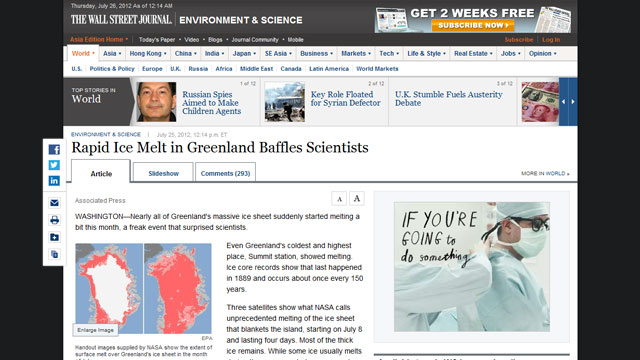 What is happening in Greenland? Nearly all of its massive ice sheet started to melt over four days starting July 8. Three satellites show what NASA calls unprecedented melting. While most of the thick ice remains, scientists around the world are concerned because it happened quickly and over a widespread area. NASA says the melting is far more than the past three decades which was about 55%. Over four days, the ice melt went from 40% of the ice sheet to an unprecedented 97%. Even its coldest and highest place also showed melting. The last time that happened was in 1889 and happens only once in every 150 years.
What is happening in Greenland? Nearly all of its massive ice sheet started to melt over four days starting July 8. Three satellites show what NASA calls unprecedented melting. While most of the thick ice remains, scientists around the world are concerned because it happened quickly and over a widespread area. NASA says the melting is far more than the past three decades which was about 55%. Over four days, the ice melt went from 40% of the ice sheet to an unprecedented 97%. Even its coldest and highest place also showed melting. The last time that happened was in 1889 and happens only once in every 150 years.
Read more on the Wall Street Journal.
Add a comment
How does this make you feel?
Loading
There are no comments yet. Add your comment to start the conversation.